Climate change
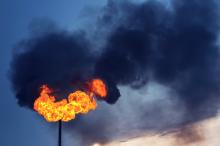
When it comes to climate change and protecting our communities’ health, time is of the essence. Each day of inaction, we allow more methane to pollute the air. By acting now, we can stop another case of cancer or asthma. We can better follow our Genesis call to till and keep the earth, and be better stewards of the fragile web of life depending on a stable climate. Our communities and God’s precious creation can't afford to wait.

FOR THOSE PAYING attention, this has been a fairly terrifying winter and spring. And I don’t just mean the presidential election. I mean that the signals we’re getting from the natural world indicate we’re crossing thresholds much more quickly than expected.
February, for instance, was the most anomalously hot month ever recorded on the planet, crushing all records. The world had pledged in Paris in December to try to hold global temperature increases to 1.5 degrees Celsius—well, February was just about at that level already.
The elevated temperatures were especially noticeable in the Arctic—for long stretches of the winter the region as a whole was as much as 18 degrees Fahrenheit above average. (Christmas Eve was almost 50 degrees warmer than normal at the North Pole). Not surprisingly, this meant the lowest levels of Arctic sea ice ever recorded by late March.
Meanwhile in the Antarctic, new data showed that sea level may be set to rise far faster than expected, as the great ice sheets start to slide into the ocean—the water could go up by meters in the course of this century, which would make the defense of most of the world’s great cities a nightmare.
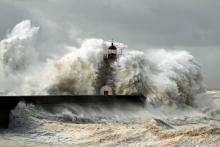
I’m a Christian, but I’m not a natural evangelizer. Talking about my faith has never come easily to me, and I prefer to quietly live my beliefs rather than speak about them. Even as a legislative advocate for the Episcopal Church, I am more at ease discussing policy ramifications than quoting scripture. Still, one urgent policy issue in particular has forced me to reconsider my distaste for religious language and challenged me to voice my faith. Galvanized by the urgency of this challenge, I’m ready to evangelize — about climate change.
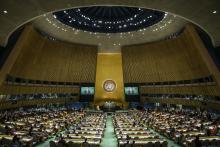
The Paris climate accord, negotiated in the French capital just weeks after the terrorist attack there in November, was signed April 22 in recognition of Earth Day, reports USA Today. World leaders representing 175 countries were present for the signing, along with 197 children, including John Kerry’s granddaughter, whom he held as he signed the agreement for the U.S.
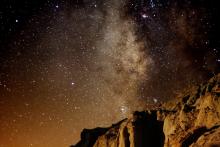
In February, President Obama designated 1.8 million acres of wild California desert as national monuments: Mojave Trails, Sand to Snow, and Castle Mountains. The California desert is a holy place, filled with spiritual values and important lessons. As Christians, this is a significant event. We know Jesus’ spiritual path included spending time in the desert wilderness to contemplate his purpose. Now, we, like Jesus and so many others, can have the beauty, solitude, dark night skies, and wild nature of the desert from which to draw inspiration, practice our faith, and grow better.
The California desert is a place where these elusive values remain, and they are vital for humankind. We have a spiritual heritage to protect, and with these three monument designations, Christian communities will forever have these living sanctuaries where we can practice our faith.

Have you ever read scripture from an agrarian perspective? We tend to read scripture with an anthropocentric perspective, but what if we read it with the land and animals in mind first? In her book An Agrarian Approach to Scripture, Ellen Davis invites us to consider reading Scripture with the land and animals at the forefront.
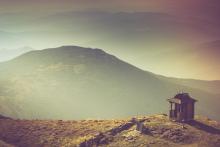
As it turns out, the faith community may have a marked advantage when it comes to dealing with global warming. According to University of British Columbia social psychologist and author Ara Norenzayan, religion primes cooperation. In his work, Norenzayan has found religious societies to be more cooperative than non-religious societies — particularly where a group's survival is threatened.

Last November, my deskmates at Sojourners (and my colleagues working all the way on the other side of the office) were interrupted by my joyful whooping and hollering at the news that President Obama had finally, finally killed the Keystone pipeline once and for all. Leading climate activist (and Sojourners contributing editor) Bill McKibben noted that the significance of the decision rippled far beyond Keystone XL itself: It made the president “the first world leader to reject a project because of its effect on the climate.”
Over the years, Keystone XL had become known by activists and journalists alike as “the zombie pipeline” — with delay after delay in the review process and legislative defeats followed by legislative resurrections in Congress as members attempted to expedite approval, the issue just wouldn’t die.
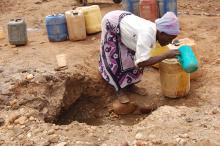
Churches in eastern and southern Africa are appealing for humanitarian aid in the region, as 36 million people grapple with the worst drought in decades. Linked to extreme El Nino weather conditions, the drought has hit countries such as Somalia, Ethiopia, Kenya, South Sudan, Malawi, and Zimbabwe, among others. The conditions have reversed normal weather patterns, upsetting people’s livelihoods.
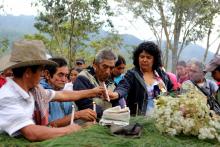
The deadly environment for activists is closely tied to recent Honduran history. Following the 2009 coup, in which democratically-elected Honduran president Manuel Zelaya was deposed, the new government declared Honduras “open for business” and granted profitable contracts to transnational companies looking to capitalize on Honduran natural resources — including resources on indigenous land. When leaders like Cáceres demanded the rights guaranteed to indigenous people by the U.N and the International Labor Convention — including the right to determine how indigenous land is used — it wasn’t great for business. The death threats followed.
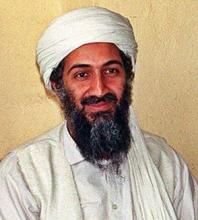
The March 1 release of a cache of documents obtained during the raid that ended with Osama Bin Laden’s death reveals some of the Al-Qaeda leader’s strange concerns.
In one letter, Bin Laden writes to his wife, warning her that the dental filling she received in Iran may have contained a computer chip used to track her movements.
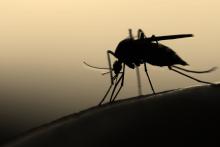
WE SPEND, in the Christian tradition, a fair amount of time meditating on Mary as she waited to give birth.
But maybe this month it would be a good idea to meditate on the millions of women around Latin America and the Caribbean who are waiting to give birth—and doing so in a state of quiet panic.
Health ministers in countries such as Jamaica, Colombia, and Brazil were telling their (enormous) populations to avoid becoming pregnant. To avoid reproduction. To avoid the most basic task of any species. In El Salvador, the health minister said it would be at least 2018 before it would be safe to get pregnant. Think about that.
The culprit is a new disease, the Zika virus, which is mainly spread by mosquitos.
Not quite new, actually—it was found in Africa decades ago. But it’s migrated to South America, perhaps during soccer’s 2014 World Cup. And it appears to be having an entirely new effect. Though innocuous enough to those who catch it (flu-like symptoms so mild that most people don’t even know they have it), it appears linked to a truly horrendous set of birth defects. In a normal year, Brazil has a couple of hundred cases of microcephaly, an incurable birth defect that may result in intellectual disabilities, seizures, and reduced life expectancy. In 2015, that number suddenly jumped to 4,000, and the best guess is that the Zika virus is the culprit.

Now that Ted Cruz has won Iowa’s Republican presidential caucus, he may want to listen more closely to those evangelicals who supported him on the subject of climate change. Just last month, the Texas senator, who chairs the Senate’s Subcommittee on Space, Science, and Competitiveness, proudly claimed, “According to the satellite data, there has been no significant global warming for the past 18 years.”

I LANDED IN Paris on Dec. 3, barely three weeks after the mass murder there of 128 people by armed extremists. On these same streets now gathered thousands from around the world—including from across the faith world—to hammer out an international agreement on climate change.
After checking in to my hotel, I made my way to the grand Notre Dame Cathedral for the ecumenical worship service organized by the Council of Christian Churches in France. While still blocks from the church, I began to hear the boisterous ringing of bells. Such joyous clanging from Notre Dame reminded the whole world that peace and hope were still possible, both on the earth and with the earth.
And the Climate Change Conference in Paris—COP 21, as it’s known—offered a needed opportunity to take a key step toward peace with the earth. The window to avoid total climate disruption is closing faster than many of us imagined possible.
I stepped into Notre Dame with awe—and an awareness that this kind of work requires prayer and miracles. Never in my wildest dreams did I think I would worship in such a magnificent and historic place. The church was nearly full. I sat near the back. Voices from the choirs rang through the massive stone sanctuary. On such a cold evening, their beauty touched and warmed us with poetry and power. The worldwide church was in attendance, dramatically offering its gifts back to the Creator.
‘Leaders can’t afford to come home empty-handed’
Before COP 21, Bill McKibben—an environmental activist, author, and Methodist (and Sojourners columnist)—observed, “Paris isn’t the game, it’s the scoreboard. It shows us how much we’ve done—and haven’t done—over the years since Copenhagen (COP 15 in 2009), when we suffered a huge defeat. There is a big enough movement now—in no small part thanks to faith communities, patriarchs, popes, and the like—that we’ll see some progress in Paris. World leaders can’t afford to come home empty-handed.”
He was right. People of faith came to Paris from every corner of the earth. Some came as negotiators and political delegates, some as observers, and others as prophetic voices to hold political leaders accountable to the science and the moral imperative of safeguarding a living planet.
As a consequence of the November terrorist attacks, public marches for climate justice—which had been expected to draw more than 200,000 people—were cancelled by French authorities. In lieu of the marches, French activists called for a “global march” in solidarity with them. At the end of November, hundreds of thousands around the world took to the streets to make clear to the leaders headed to Paris that the whole world was watching. More than 570,000 people marched in 2,300 events in 175 countries, according to organizers, making it the biggest set of global climate change marches in history. “The charge from the streets for leaders to act on climate has been deafening, with record numbers turning out across the world,” said Emma Ruby-Sachs, campaign director for Avaaz, a global civic movement.
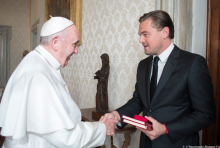
Possibly hoping for divine intervention ahead of next month’s Academy Awards, Hollywood star Leonardo DiCaprio met with fellow environmentalist Pope Francis. Speaking Italian, DiCaprio kissed the pontiff’s hand on Jan. 28 and offered a “grazie” [thank you] “for granting me this private audience with you.” Then, switching to English, he gave the pontiff a book of paintings by Early Netherlandish painter Hieronymus Bosch, whose works meld fantastic imagery with reality.
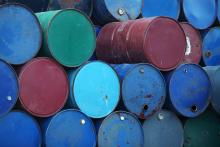
TWO RECENT news items: 1) A new U.N. report finds that over the last 20 years, 4.1 billion people have been injured in extreme weather events—the floods and forest fires that are proliferating as the climate warms. The report adds that the total will keep steeply climbing in the years ahead.
2) Two teams of investigative journalists, following separate document trails, proved in the course of the fall that Exxon—now ExxonMobil, the world’s most profitable company—had known everything there was to know about climate change 25 years ago. And then lied about it, helping to set up the elaborate infrastructure of climate denial that has prevented serious international action on global warming.
I don’t know how to keep these two things in my head at the same time without giving myself over to hatred. I know I’m not supposed to hate, and much of the time I’m able to work on climate change without losing my cool. I can meet oil industry executives, understand the problems that make it hard for them to move quickly; I can and do sympathize deeply with coal miners and tar sands miners whose lives will be disrupted as we take necessary action.
But for Exxon? There have been hours, reading these reports in the Los Angeles Times and the Pulitzer-winning InsideClimate News, when I’ve just found myself in a blind rage, unable to comprehend how people—professed Christians, most of them, in that Texas hotbed of Christianity—could act this way. Their scientists told them quite straightforwardly that burning coal and oil was heating the planet and that it was going to be disastrous. By the mid-1980s, before any politician was talking about climate change, they had good computer models indicating (correctly as it turned out) how much the earth would warm. And they believed those predictions—they helped guide their actions in places like the Arctic, where they were bidding for leases in waters they knew would soon be free of ice.
But they also knew that serious action on climate change would cost them money—would force them to start switching their business from fossil fuel to renewable energy. And so they went to work, helping to set up front groups that hired veterans of the tobacco wars to open a new front of obfuscation. Their CEO, Lee Raymond, gave a speech in Beijing in 1997 insisting that the climate models were hokum, and that the earth was cooling.

Before the announcements of the new agreement at COP 21, when the thousands of people who were not closely engaging with official delegates of the 190 countries gathered in Paris, I was sitting at a small white table with my new found friend Kenneth.
We spoke for nearly an hour before I asked him the question.
We had been talking about the work of the Ghanian Religious Bodies Network On Climate Change, which brings together Muslims, Christians, and Indigenous peoples across Ghana to work on climate change because, after all, “climate change impacts all of us.” We touched upon capacity building, workshops, seminary education, practicalities, and visions. It was the kind of conversation that most people who were not directly involved in the negotiations were in Paris to have: networking, information sharing, and building cross-cultural relationships around common endeavors.
Finally, I asked him, “Are you religious?”
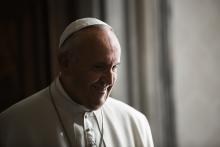
Pope Francis hailed the “historic” climate change agreement signed in Paris, urging the international community to swiftly implement the deal.
Speaking to the faithful in St. Peter’s Square on Dec. 13, Francis called on world leaders to act on the unprecedented environmental agreement signed on Dec. 12 by nearly 200 countries.
“The conference on climate has just finished in Paris with the adoption of an agreement, defined by many as historic. Carrying it out will require a unanimous commitment and generous dedication on everyone’s part,” he said.
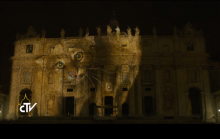
An extraordinary illuminated projection of images of the natural world onto St. Peter’s Basilica on the evening of Dec. 8 drew thousands of awed spectators to the Vatican and delighted untold numbers more watching online and via widespread media coverage of the three-hour show.
But not everyone was happy with the spectacle, not by a long shot, as social media and conservative Catholic sites erupted with indignation.
“This has gone beyond ridiculous,” fumed a conservative blogger, the Rev. John Zuhlsdorf, who called it “irreverent” to use a sacred space for a secular purpose.
“Why not rent out the Sistine chapel too, while they’re at it?”
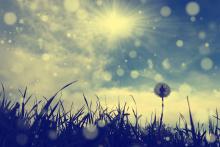
At COP21 last week, religious leaders participated in a “Fast for Climate” and delivered petitions with more than 1.7 million signatures to Christiana Figueres, executive secretary of the UN Framework Convention on Climate Change, demanding immediate climate action.
These leaders, from different faith traditions, also held a press conference at COP21 with the message that they are united in the fight against climate change.
COP21 is not only a gathering of world leaders to achieve an agreement on climate change — it is a gathering for all concerned with the issue. This has included religious leaders from many of the world’s faiths and denominations, who realize a responsibility to speak out on grave societal illnesses and care for the world.
One of the most intriguing and lifegiving events at COP21 was an ecumenical worship service held at the Notre Dame Cathedral on Dec. 3, organized by the Council of Christian Churches in France.